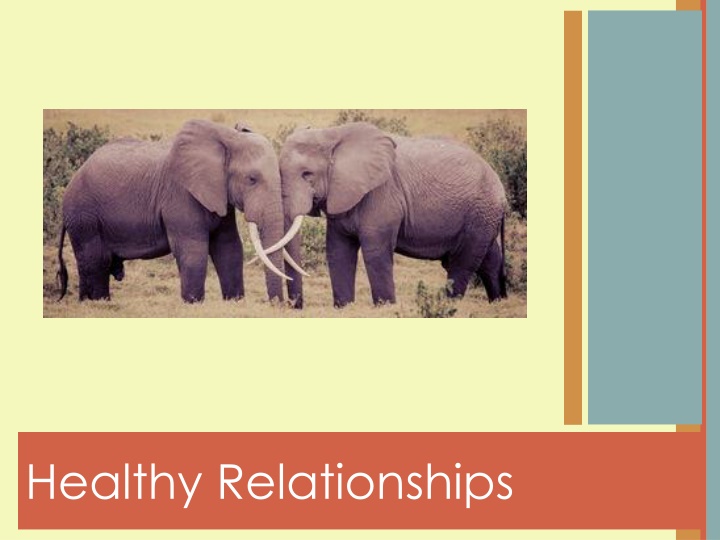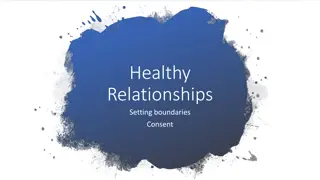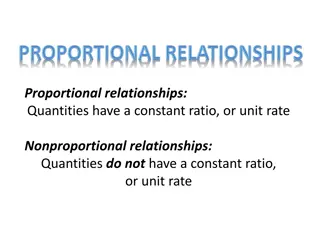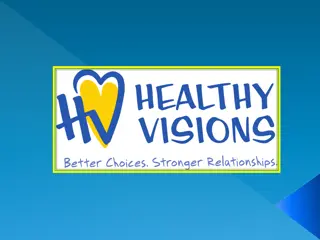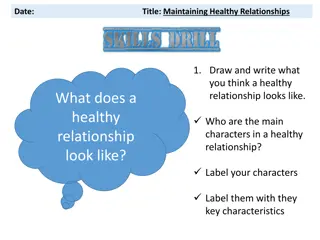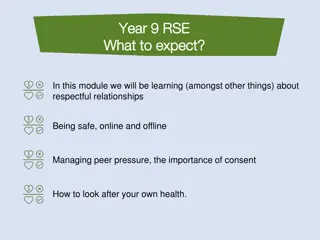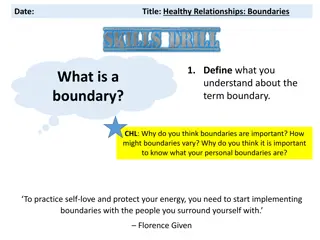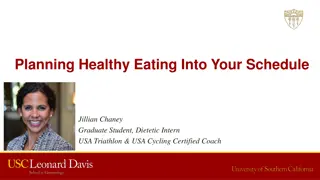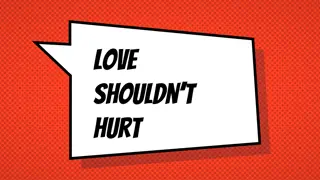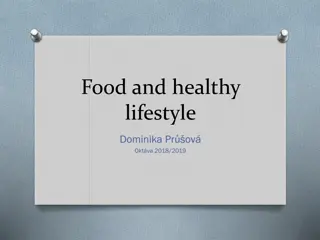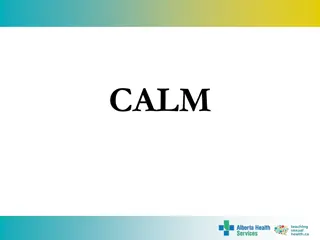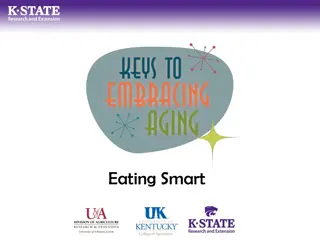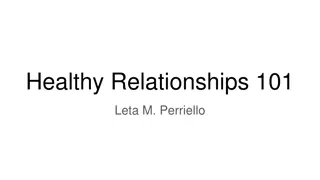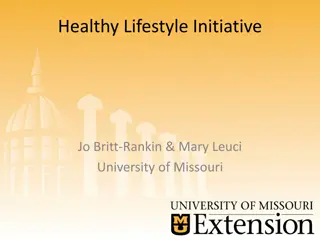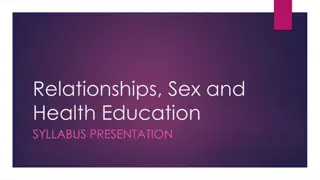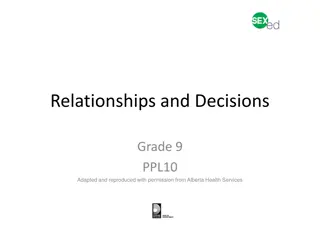Healthy Relationships
Healthy relationships are essential for our well-being, encompassing various types like friendships, family, and romantic partnerships. A healthy relationship is characterized by mutual respect, open communication, and the willingness to work through challenges together. Setting boundaries, prioritizing self-care, and fostering trust are key aspects of maintaining a healthy relationship.
Download Presentation

Please find below an Image/Link to download the presentation.
The content on the website is provided AS IS for your information and personal use only. It may not be sold, licensed, or shared on other websites without obtaining consent from the author.If you encounter any issues during the download, it is possible that the publisher has removed the file from their server.
You are allowed to download the files provided on this website for personal or commercial use, subject to the condition that they are used lawfully. All files are the property of their respective owners.
The content on the website is provided AS IS for your information and personal use only. It may not be sold, licensed, or shared on other websites without obtaining consent from the author.
E N D
Presentation Transcript
There are many types of relationships in our lives. It is important that in each one we feel valued and empowered. Classmates Sexual Relationships Friendships Family Romantic
What is a healthy relationship?
What is a healthy relationship? 1. Both partners know that they are responsible for their own individual happiness. 2. Neither person is really trying to control or fix the other person. 3. The relationship is balanced (no power struggles decision aggregate 50/50). 4. Conflicts are dealt with head-on and then dropped. 5. Feelings are shared honestly and openly. 6. Each person makes time to take care of themselves. 7. Both partners are willing to put the relationship before themselves (willing to work as a unit when necessary). 8. Both people understand and accept that they re not going to agree on everything it s ok to agree to disagree! 9. They both truly value the relationship and will work through challenges. 10. They want to be together simply for the sake of being together and not to fulfill an insecurity.
What is a healthy relationship? Communication is a key part to building a healthy relationship. The first step is making sure you both want and expect the same things -- being on the same page is very important. The following tips can help you create and maintain a healthy relationship: Speak Up. In a healthy relationship, if something is bothering you, it s best to talk about it instead of holding it in. Respect Your Partner. Your partner's wishes and feelings have value. Let your significant other know you are making an effort to keep their ideas in mind. Mutual respect is essential in maintaining healthy relationships. Compromise. Disagreements are a natural part of healthy relationships, but it s important that you find a way to compromise if you disagree on something. Try to solve conflicts in a fair and rational way. Be Supportive. Offer reassurance and encouragement to your partner. Also, let your partner know when you need their support. Healthy relationships are about building each other up, not putting each other down. Respect Each Other s Privacy. Just because you re in a relationship, doesn t mean you have to share everything and constantly be together. Healthy relationships require space.
Healthy Boundaries Creating boundaries is a good way to keep your relationship healthy and secure. By setting boundaries together, you can both have a deeper understanding of the type of relationship that you and your partner want. Boundaries are not meant to make you feel trapped or like you re walking on eggshells. Creating boundaries is not a sign of secrecy or distrust -- it's an expression of what makes you feel comfortable and what you would like or not like to happen within the relationship. Remember, healthy boundaries shouldn t restrict your ability to: Go out with your friends without your partner; Participate in activities and hobbies you like; Keep passwords to your email, social media accounts or phone private; Respect each other s individual likes and needs.
Sex and Healthy Relationships In a healthy relationship, both parties are ready and feel comfortable with sexual activity. You shouldn t have to have sex to stay in the relationship. You may feel comfortable kissing or holding hands, but not want to go any further. That s ok. Deciding whether you want to have sex or when you should is a decision you should make when it feels right for YOU. In a healthy relationship, both people respect each other s decisions - even when they don't like them. Having sex can raise the intensity of emotions that people feel for each other -- whether you re in a serious or casual relationship. At times, this elevation is a good and enjoyable thing, but sometimes it makes a hard situation worse. It s important that you feel ready and confident in your decisions about having sex.
Sex and Healthy Relationships If you are thinking about when to have sex, keep in mind: You should feel comfortable with your decision. Talk with your partner about safer sex practices, like getting tested for STIs and considering birth control options. Be honest with yourself and your partner. If you re not ready, that s ok and your partner should respect it. If something scares you or makes you feel uncomfortable, you can say no at any time. You have the right to talk openly and honestly about your fears, worries and feelings. If your partner tries to threaten or guilt you into having sex, it can be a sign of an unhealthy relationship. You deserve better. No matter how long you ve been with someone or how many times you ve done something, you have the right to change your mind and say no at anytime for any reason. You have control over your body, and no one else has the right to tell you what to do with it. In a healthy relationship, the decision to have sex is agreed on mutually and not because one person feels they have to have sex.
Everyone deserves a healthy relationship. A healthy relationship makes each person feel respected, supported and encouraged to be who they are.
Personal Rights in a Relationship THE RIGHT to refuse requests without having to feel guilty or selfish. THE RIGHT to express my feelings, including anger, as long as I don't violate the rights of others. THE RIGHT to be competitive and to achieve. THE RIGHT to have my needs be as important as the needs of other people. THE RIGHT to decide which activities will fulfill my needs. THE RIGHT to make mistakes and be responsible for them. THE RIGHT to have my opinions given the same respect and consideration as others'. THE RIGHT to change my mind. THE RIGHT to be independent. THE RIGHT to be treated respectfully. THE RIGHT to be cooperative and giving and not be taken advantage of. THE RIGHT to be safe.
Unhealthy Relationships Healthy conflict and disagreements are normal in relationships as long as they can be resolved in respectful manner. However, if you experience a sudden change in your relationship or notice that a pattern of bad behaviors have developed over a period of time you may want to examine your relationship. If you are experiencing any of the behaviors listed below you may be in an unhealthy relationship and want to seek some support. Threats of physical violence towards you, themselves, someone your care about or pets Physical violence hitting, punching, slapping, shoving, choking, pushing Intimidating behaviors including excessive anger, throwing objects and destruction of property Violation of personal space/boundaries by unwanted touching or sexual activity, invasion of virtual spaces by checking emails, texts and phone messages, going through your personal things Isolation from friends, family and things you enjoy doing Suspicion of your actions and accusations of cheating Jealousy of friends and family Emotional abuse such as put downs, name calling, guilt trips, humiliation, ignoring or the silent treatment Stalking using excessive contact via phone, email, text or unexpectedly showing up to check up.
Unsure About Your Relationship? Relationships that are not healthy are based on power and control, not equality and respect. In the early stages of an abusive relationship, you may not think the unhealthy behaviors are a big deal. However, possessiveness, insults, jealous accusations, yelling, humiliation, pulling hair, pushing or other negative, abusive behaviors, are -- at their root forms of power and control. If you think your relationship is unhealthy, it's important to think about your safety now. Consider these points as you move forward: Understand that a person can only change if they want to. You can't force your partner to alter their behavior if they don't believe they're wrong. Focus on your own needs. Are you taking care of yourself? Your wellness is always important. Watch your stress levels, take time to be with friends, get enough sleep. If you find that your relationship is draining you, consider ending it. Connect with your support systems. Often, abusers try to isolate their partners. Talk to your friends, family members, teachers and others to make sure you're getting the emotional support you need. Remember, our advocates are always ready to talk if you need a listening ear. Think about breaking up. You deserve to feel safe and accepted in your relationship. Consider your own personal growth and safety. Even though you cannot change your partner, you can make changes in your own life to stay safe. Consider leaving your partner before the abuse gets worse. Remember, abuse is always a choice and you deserve to be respected. There is no excuse for abuse of any kind. If you want to end your relationship but are concerned about your safety, the Counseling Center can help you with Safety Planning.
This is the Power and Control Wheel. Each spoke in the wheel signifies a way someone may choose to control and take power over another in a relationship. The wheel is divided into 3 themes that comprise unhealthy relationships. An unhealthy relationship is when one person makes the other feel . 1) they have no one else; 2) they don t know who they are and aren t worthy of better; 3) Afraid to make change. Does anything in the wheel remind you of a current or past relationship(s)? Does anything in the wheel remind you of what you see in a friend s relationship(s)?
How can you help a friend? Listen to what your friend has to say. Don't be judgmental! Don't make them feel ashamed. They probably feel bad enough already. Tell your friend that you are available when they need to talk . Make it clear that you care, and that you are worried. Talk in private and don't gossip about what your friend has confided. Let the person know why you are concerned. Be specific. Refer to certain incidents you have witnessed and not to the relationship in general. Talk about what you saw and how it made you feel . Tell them the ways you believe the specific behavior is having an impact on them - "When she put you down you seemed embarrassed and then you made excuses for what she did." Or "When he was yelling you seemed frightened.
RESOURCES! The Counseling Center can help you navigate many relationship topics! You want to learn more about healthy relationships Something is happening in your relationship and you are unsure what to think or feel about it Your partner makes you feel bad about who you are and you don t know what to do Your partner has started being abusive and you are uncertain what to do You want to end your relationship but don t know how to break-up You are concerned about your safety as you plan to break-up with your partner You are unsure how to support a friend who is in an abusive relationship You don t have to be in crisis to use these services! Many students come in to talk with the counselors about their relationship or to learn more about healthy relationships.
Getting Help at Rose Talk to someone. The Counseling Office provides confidential reporting. Faculty and staff are here for you but remember, they are legally obligated to report information. RAs/SAs can help too but remember, they are legally obligated to report information. Help is always available! 24 hours a day (Public Safety can connect you) 812-877-8590 Counseling Services (M-F/ 8a-5p) 812-877-8537 Appointments and walk-ins. The National Domestic Abuse Hotline 1-800-799-7233 www.thehotline.org
References/Acknowledgements Information was taken directly from: University of New Hampshire Sexual Harassment and Rape Prevention Program (SHARPP) (slideshare presentation) Skin Deep: Curriculum Objective Educate Students on the Essential Aspects to Developing Healthy Relationships (created by Arrie Berlinski) Vanessa Granger-Belcher, Rose-Hulman Institute of Technology, Counseling Services Huffington Post: http://www.huffingtonpost.com/jennifer-twardowski/10-characteristics-of- a-healthy-relationship_b_8578954.html
